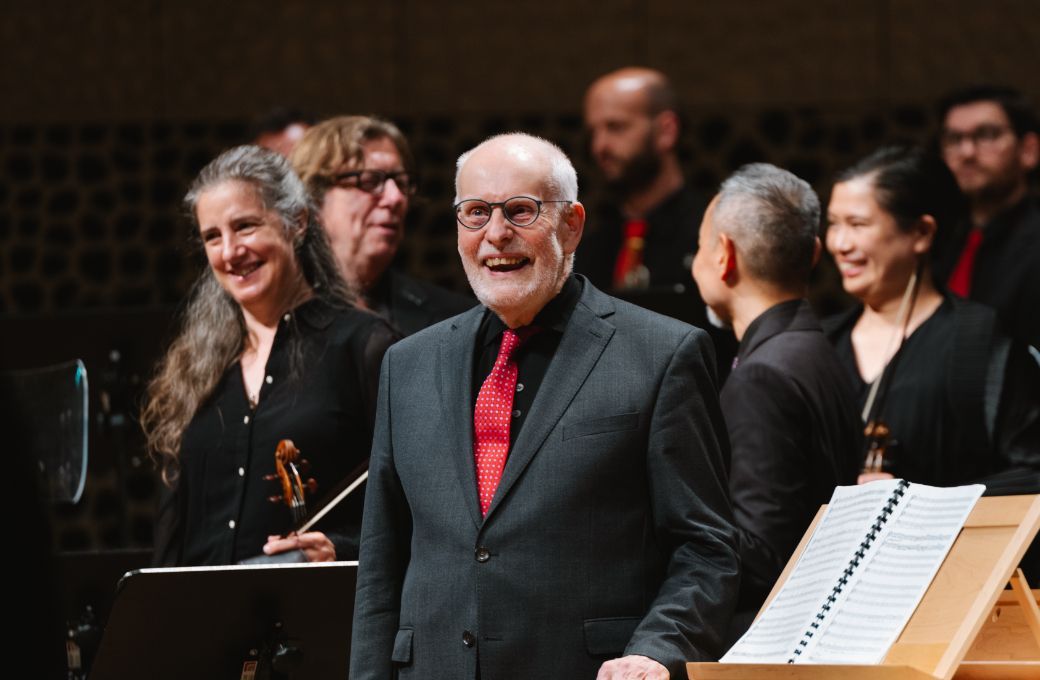From the moment the Amsterdam Baroque Orchestra and Choir took to the stage – each musician, including Ton Koopman, donning a bright red tie – the tone for the evening was unmistakably set. This visual flourish perfectly echoed the ceremonial character of the three secular cantatas on the programme: Tönet ihr Pauken!, Herkules auf dem Scheidewege and Auf, schmetternde Töne. Written for courtly celebrations and public occasions, these works carry all the pomp and gravitas of festive state commissions.

From the jubilant opening timpani strokes of BWV214, the ensemble projected precision, clarity and rhetorical energy. Koopman led with his trademark vitality, shaping each phrase with brisk, articulate gestures. The music spoke in short, breath-like phrases, executed with rhythmic tautness. The orchestral sound was crisp and transparent, opting for a lean, finely chiseled sonority that made contrapuntal detail sparkle. Strings were buoyant and clean, winds vivid but never brash, and the overall effect was one of sonic “high definition” – a tactile, granular sound that lent the music immediacy and brilliance.
The vocal soloists were equally engaging. Hana Blažíková (soprano), Alex Potter (countertenor), Tilman Lichdi (tenor) and Klaus Mertens (bass) each brought sincere personality to their roles, with just the right touch of theatricality. Their performance was expressive, conveying the text's tone of praise and celebration with sincerity and, at times, a welcome sense of humour.
Though Blažíková’s soprano occasionally lost projection in one or two soft entries, overall her silvery tone and graceful phrasing expressed her arias in a charming way – especially in “Blast die wohlgegriffnen Flöten”. Mertens brought his customary gravitas to the bass solos, combining warmth with clarity and anchoring the ensemble with unfailing stylistic poise.
Potter sang with intelligence and sensitivity, especially in “Treues Echo dieser Orten” from BWV213, where he vividly interacted with an echo soprano from the choir, gently interweaving with the wind players. In the extended duet “Ich bin deine, du bist meine” with Lichdi, the two voices began with energy and charm, though the dramatic momentum sagged slightly midway. Still, the cheeky staged kiss at the close offered a light-hearted resolution to a moment that had briefly faltered.
The choir, modest in size, made a vivid impact both visually and sonically. At the start of the second half, they entered in stately procession to the brassy intrada of Auf, schmetternde Töne – a moment that affirmed the cantata’s ceremonial function with flair and gravity. Throughout the evening, the well-blended ensemble sang with firm rhythm and lucid diction, giving radiant lift to the final choruses of each work.
This performance marked Koopman’s debut at the Elbphilharmonie and, fittingly, the final concert of this season’s Das Alte Werk series. Under his direction, Bach’s secular cantatas emerged as living works – exuberant, eloquent and still capable of lighting up a room nearly 300 years after their creation. It was a meaningful, celebratory midsummer evening to be remembered.


